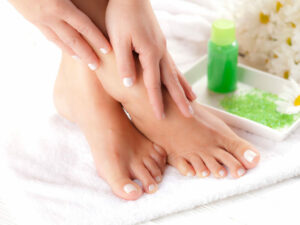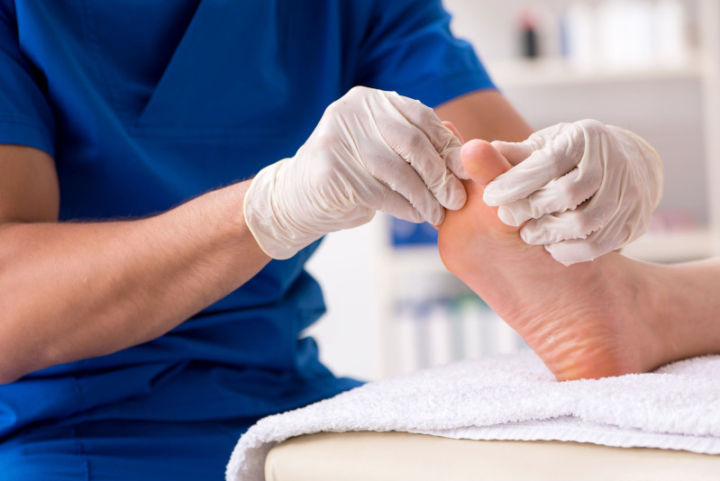If you are a diabetic, you know that sores and lesions can form on your skin as a result of the disease. These can be painful and difficult to treat. In this blog post, we will discuss what diabetic sores are, how to identify them, and how to treat them. We will also provide some tips for preventing diabetic sores from forming in the first place.
Contents
What Are Diabetic Sores?
Diabetes is a chronic condition that occurs when the body cannot properly produce or use insulin. Insulin is a hormone that helps the body convert sugar into energy. Without insulin, sugar builds up in the blood, which can lead to serious health problems. When diabetes is not controlled, it can damage the blood vessels and nerves. This can cause problems with circulation and sensation in the extremities, which can lead to sores or ulcers.
Diabetic sores, also known as diabetic ulcers, are open wounds that can develop on the feet or legs as a result of diabetes. The sores are usually caused by poor circulation and nerve damage, which can lead to infection. If left untreated, diabetic sores can become serious and even life-threatening. That is why it is important to know about them and how to treat them.
What Causes Diabetic Sores?
There are several factors that can contribute to the development of diabetic sores. Following are some of the most common causes:
Poor circulation
Circulation problems can occur when the blood vessels are damaged by diabetes. This can cause the blood to flow more slowly and make it difficult for wounds to heal. When circulation is poor, the feet and legs are especially at risk for developing sores.
Nerve damage
Diabetes can also damage the nerves, which can lead to loss of sensation in the feet or legs. This can make it difficult to feel pain or pressure, so you may not realize you have a sore until it has become infected. That is why it is important to check your feet regularly for any cuts, scrapes, or sores.
Infection
Diabetic sores are more susceptible to infection because of poor circulation and nerve damage. Infections can cause the sores to become red, swollen, and painful. If left untreated, infections can spread and lead to serious health problems. You should see your doctor if you think you have an infection.
Inadequate nutrition
 People with diabetes may also have poor nutrition, which can contribute to the development of sores. Poor nutrition can make it difficult for wounds to heal and make you more susceptible to infection. It is important to eat a balanced diet and get adequate nutrition if you have diabetes.
People with diabetes may also have poor nutrition, which can contribute to the development of sores. Poor nutrition can make it difficult for wounds to heal and make you more susceptible to infection. It is important to eat a balanced diet and get adequate nutrition if you have diabetes.
Poor hygiene
If you have diabetes, it is important to practice good hygiene. This means washing your feet every day and keeping them clean and dry. You should also trim your nails and wear shoes that fit well. Poor hygiene can lead to infection and make it more difficult for wounds to heal. So, be sure to practice good hygiene if you have diabetes.
These are some of the most common causes of diabetic sores. If you have diabetes, it is important to be aware of these factors and take steps to prevent them.
How To Identify Them?
Diabetic sores can be difficult to identify because they often do not cause pain. That is why it is important to check your feet regularly for any cuts, scrapes, or sores. Diabetic sores usually have the following characteristics:
- Redness: It is one of the earliest signs and can be a sign of infection. When you see redness on your feet, it is important to check for other signs of diabetic sores.
- Swelling: This can be a sign of infection or poor circulation. Swelling can also make it difficult to walk or put pressure on the affected area.
- Pain: Pain is often a late sign of diabetic sores. If you have diabetes and experience pain in your feet, it is important to see your doctor.
- Inflammation: It is a sign of infection and can make the area around the sore red, hot, and painful.
- Debris: Diabetic sores often have dead tissue, pus, or other debris. This can be a sign of infection.
- Blisters: These are common signs of diabetic sores. Blisters can be filled with pus or blood and can be very painful.
- Pus or drainage: These are signs of infection and can be a sign that the sore is getting worse. In some cases, pus or drainage can also lead to fever.
If you notice any of these signs, it is important to see your doctor right away. Early treatment can help prevent the sores from becoming serious. So, be sure to check your feet regularly and see your doctor if you notice any of these signs.
Treatment Options For Diabetic Sores
There are many treatment options available for diabetic sores. The best treatment will depend on the severity of the sore and the underlying cause. Treatment options include:
Cleansing
 Cleansing is the first step in treating diabetic sores. When you cleanse the sore, you remove debris and dead tissue. This helps to prevent infection and promotes healing. The steps for cleansing a sore are:
Cleansing is the first step in treating diabetic sores. When you cleanse the sore, you remove debris and dead tissue. This helps to prevent infection and promotes healing. The steps for cleansing a sore are:
- Wash your hands with soap and water.
- Use a mild soap and warm water to clean the sore.
- Gently pat the sore dry with a clean towel.
- Apply an ointment to the sore.
Debridement
Debridement is the process of removing dead or damaged tissue. This can be done with a scalpel, laser, or other surgical methods. Debridement helps to promote healing and prevent infection. It is often used in combination with other treatment methods. The steps for debridement are:
- Wash your hands with soap and water.
- Apply a local anesthetic to the area around the sore.
- Use a scalpel or other surgical instrument to remove dead or damaged tissue.
- Gently clean the area with saline solution.
- Apply an ointment to the sore.
Bandages
Bandages can be used to protect the sore and promote healing. They can also help to prevent infection. Bandages should be changed regularly to keep the wound clean and dry. The steps for applying a bandage are:
- Wash your hands with soap and water.
- Apply an ointment to the sore.
- Place a clean bandage over the sore.
Antibiotics
Antibiotics are often used to treat diabetic sores that are infected. They can help to clear the infection and promote healing. When choosing an antibiotic, it is important to select one that is effective against the specific type of bacteria that is causing the infection. The steps for using antibiotics are:
- Wash your hands with soap and water.
- Apply a local anesthetic to the area around the sore.
- Inject the antibiotic into the area around the sore.
- Change the bandage regularly.
Surgery
 In some cases, surgery may be necessary to treat diabetic sores. Surgery can help to remove dead or damaged tissue and promote healing. It is often used in combination with other treatment methods. You need to be sure that you are healthy enough for surgery. It is performed under general anesthesia. The doctor will make an incision in the skin and remove the dead or damaged tissue. The area will be cleaned and a dressing will be applied. You will need to stay in the hospital for a few days after surgery. After surgery, it is important to keep the wound clean and dry. You should also avoid putting pressure on the wound. Follow your doctor’s instructions for wound care.
In some cases, surgery may be necessary to treat diabetic sores. Surgery can help to remove dead or damaged tissue and promote healing. It is often used in combination with other treatment methods. You need to be sure that you are healthy enough for surgery. It is performed under general anesthesia. The doctor will make an incision in the skin and remove the dead or damaged tissue. The area will be cleaned and a dressing will be applied. You will need to stay in the hospital for a few days after surgery. After surgery, it is important to keep the wound clean and dry. You should also avoid putting pressure on the wound. Follow your doctor’s instructions for wound care.
Topical treatments
Topical treatments are applied to the skin. They can help to reduce pain and inflammation. Topical treatments include:
- Corticosteroids: These are anti-inflammatory drugs that can be used to reduce swelling and pain. Corticosteroids can be applied topically or injected into the area around the sore.
- Nonsteroidal anti-inflammatory drugs (NSAIDs): These are drugs that can be used to reduce pain and inflammation. NSAIDs can be applied topically or taken orally.
These are just a few of the treatment options available for diabetic sores. Be sure to talk to your doctor about the best treatment option for you. They can help you to find the right treatment and provide you with more information on how to care for your wound.
Prevention Tips
Now that you know how to treat diabetic sores, let’s talk about how to prevent them. There are a few things you can do to prevent diabetic sores. These include:
Manage your blood sugar levels
This is the most important thing you can do to prevent diabetic sores. Keeping your blood sugar levels under control can help to reduce the risk of developing sores. You can do this by following a healthy diet, exercising regularly, and taking your medications as prescribed.
Keep your skin clean and dry
Washing your skin regularly with soap and water can help to remove dirt and bacteria. You should also avoid exposure to harsh chemicals or irritants. This can help to prevent sores from developing. It is also important to keep your skin moisturized. This can help to prevent dryness and cracking.
Inspect your feet regularly
 You should check your feet every day for cuts, scrapes, or other wounds. If you find a wound, you should clean it and apply an antibiotic ointment. You should also see your doctor as soon as possible to have the wound checked. Remember not to put off seeing your doctor because you think the wound is not serious.
You should check your feet every day for cuts, scrapes, or other wounds. If you find a wound, you should clean it and apply an antibiotic ointment. You should also see your doctor as soon as possible to have the wound checked. Remember not to put off seeing your doctor because you think the wound is not serious.
Wear shoes that fit properly
Wearing shoes that fit properly can help to prevent sores. Shoes should be comfortable and provide support. You should also avoid walking barefoot, as this can increase your risk of developing sores. Wearing the wrong shoes can also cause sores. If you have diabetes, be sure to talk to your doctor about what type of shoes you should wear.
Do not smoke
Smoking can cause problems with blood flow and increase your risk of developing sores. If you smoke, it is important to quit. This is because smoking can make it harder for your body to heal. So, you need to take steps to quit smoking. There are many resources available to help you quit. You can avail of these resources by talking to your doctor as soon as possible.
Eat a healthy diet
Eating a healthy diet can help to prevent sores. A healthy diet includes plenty of fruits, vegetables, and whole grains. It is also important to get enough protein. You should speak to a nutritionist about what type of diet is best for you. Try to eat a variety of foods to get all the nutrients you need. It is also important to drink plenty of water. This can help to keep your skin hydrated and prevent sores from developing.
Exercise regularly
 Exercising regularly can help to improve blood circulation. This can help to prevent sores. Exercise can also help you to lose weight. This is important because being overweight can increase your risk of developing sores. Set a goal to exercise for at least 30 minutes on most days of the week. You can do this by going for a walk, taking a bike ride, or swimming.
Exercising regularly can help to improve blood circulation. This can help to prevent sores. Exercise can also help you to lose weight. This is important because being overweight can increase your risk of developing sores. Set a goal to exercise for at least 30 minutes on most days of the week. You can do this by going for a walk, taking a bike ride, or swimming.
These are just a few tips to help you prevent diabetic sores. Be sure to talk to your doctor about what you can do to reduce your risk. They can provide you with more information on how to care for your feet and prevent sores.
There you have it! These are just a few things you need to know about diabetic sores. Be sure to keep these tips in mind to help prevent them. If you do develop a sore, be sure to see your doctor as soon as possible. They can provide you with the treatment you need to heal quickly.
Conclusion
If you have diabetes, it’s important to be aware of the risk of developing sores. These sores can be painful and difficult to heal. However, there are treatments available that can help. Be sure to talk to your doctor if you think you may have a sore. With proper treatment, you can heal quickly and prevent further complications.
Diabetes can be a difficult condition to manage, but it’s important to take care of your health. By being aware of the risks and knowing how to treat diabetic sores, you can keep your skin healthy and avoid further complications.
If you need assistance with your diabetes care, consider contacting Mantra Care. Our team of experts can help you manage your diabetes and improve your overall health with our Diabetes Control Program. You can also get in touch with their nutrition experts through our online nutrition counseling, who can guide you through the process and help you achieve your fitness goals.


